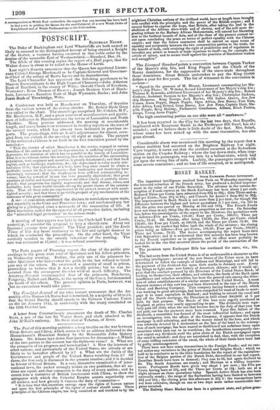The Post of this morning publishes a long treatise on
the war between Great Britain and China, which seems to be an address delivered to the Massachusett's Historical Society by the Honourable John Quincy Adams. Mr. Adams lays down four questions for discussion-1. Which of the two panies to the contest has the righteous cause ? 2. What are the prospects of its progress and termination ? 3. How the interests of other nations, and particularly of the United States, are already or are likely to be hereafter affected by it ? 4. Ni'hat are the duties of the Government and people of the United States resulting from it? Of these, the first only is discussed in the present treatise ; and it is decided in favour of Great Britain. In a very discursive examination of inter- national laws, the author strongly insists on two positions, that all na- tions are equal, and that commerce is the duty of every nation ; and be enters into a narrative of British intercourse with China, to show the arrogance with which the Celestial Empire asserts superiority over all nations, and how grossly it violates the duty of commerce- " It is time that this enormous outrage upon the rights of human nature and upon the first principles of the rights of nations should cease. These principles of the Chinese empire, too long connived at and truckled to by the mightiest Christian nations of the civilized world, have at length been brought into conflict with the principles and the power of the British empire ; and I cannot forbear to express the hope, that Britain, after taking the lead in the abolition of the African slave-trade and of slavery, and of the still more de- grading tribute to the Barbary African Mahometans, will extend her liberating arm to the furthest bounds of Asia, and at the close of the present contest in- sist upon concluding the peace on terms of perfect equality with the Chinese empire; and that the future commerce shall be carried on upon terms of equality and reciprocity between the two communities parties to the trade, for the benefit of both, each retaining the right of prohibition and of regulation to interdict any article or branch of trade injurious to itself—as, for example, the article of opium, and to secure itself against the practices of fraudulent traders and smugglers."


























 Previous page
Previous page